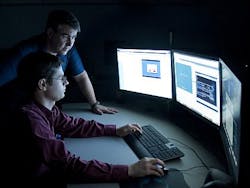Advanced cyber security for C4ISR computer systems is aim of Air Force cyber program
ROME, N.Y., 9 Aug. 2013. U.S. Air Force researchers are asking industry for ideas on a broad range of computer and information technologies to enable U.S. and allied warfighters to avoid, fight through, survive, and recover from advanced cyber threats.
Officials of the Air Force Research Laboratory's Information Directorate in Rome, N.Y., this week released a solicitation (BAA-RIK-13-06) for the Advanced, Trusted, Secure Hardware and Software System Computational Technologies program, which seeks to develop advanced cyber security technologies over the next five years.
Researchers are asking industry for white papers that describe technologies for innovative and potentially disruptive technologies that support trusted architectures for high-assurance, secure, and resilient computing for command, control, communications, computer, intelligence, surveillance and reconnaissance (C4ISR).
Technologies also should increase computational sophistication, capacity, energy, and cost efficiencies of trusted and secure layered information processing for battlefield systems and networks, as well as help design secure complex software-intensive systems.
Of particular interest, Air Force researchers say, are technologies that can help warfighters make quick decisions, automate labor-intensive and error-prone aspects of system software development, and improve the usability of military computers.
The four primary technical areas of interest are: information technology for processing Air Force C4I systems; trusted software engineering; quantum information processing; and trusted computing architectures.
Researchers expect to spend about $25 million on this program over the next five years: $4.5 million in 2014, $5 million in 2015, $5.2 million in 2016 and 2017, and $5 million in 2018. Individual awards will be for as long as three years and for as much as $1 million apiece.
Companies interested should send three-to-five-page white papers summarizing their proposed approaches to the Air Force's Christopher Flynn by email at [email protected], or by post to ATTN: Christopher Flynn, AFRL/RITA, 525 Brooks Road., Rome, NY 13441.
Deadlines are 3 March 2014, 2 March 2015, 1 March 2016, 1 March 2017, and 1 March 2018. White papers will be accepted until 28 Sept. 2018. The white papers will help researchers determine the most promising solutions. Those with the best ideas may be invited to submit technical and cost proposals.
For technical questions contact the Air Force's Christopher Flynn by phone at 315-330-3249, or by email at [email protected]. for contracting questions contact Lynn white by phone at 315-330-4996 or by email at [email protected].
More information is online at https://www.fbo.gov/spg/USAF/AFMC/AFRLRRS/BAA-RIK-13-06/listing.html.

